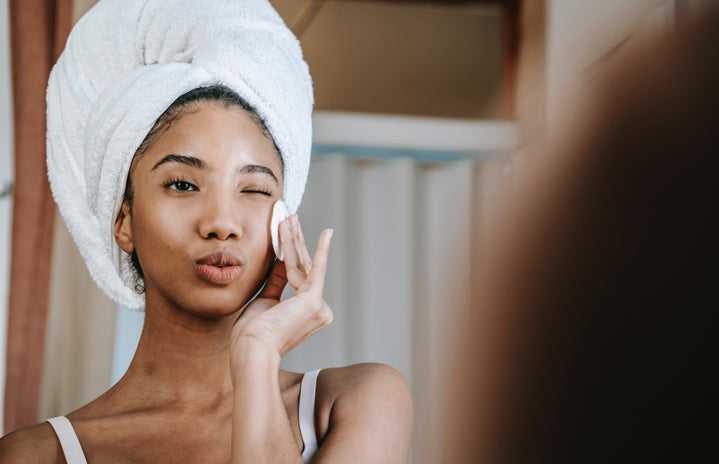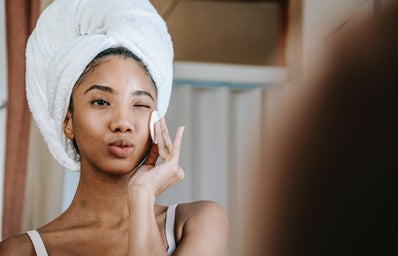Autumn is nearly here—school is starting, the air is cooling, and the leaves are turning golden. While some might store away summer essentials like sunscreen, it’s important to remember that sunscreen is not just a seasonal accessory. Quality sun protection is essential year-round. No matter the season, applying SPF is crucial for healthy skin.
Some might argue that they just don’t need sunscreen. After all, some skin types provide better protection against the sun than others. Plus, who wants to ruin the chances of getting a good tan?
Though a tan may be attractive, there’s no such thing as a healthy tan. According to board-certified dermatologist Elizabeth Bahar Houshmand, “A tan is your body’s response to injury,” statistically increasing your chances of getting skin cancer as you get older. About 9,500 people in the U.S. are diagnosed with skin cancer every day, and one in five Americans is expected to develop it in their lifetime.
There should be no excuse to not wear sunscreen. But, in case you need motivation, here are three reasons why sunscreen should be a part of your daily skincare routine.
[picture of sunscreen bottles here]
One: Sunscreen Reduces Signs of Aging
Every day, the sun casts rays of ultraviolet light down to the Earth. In small amounts, this UV radiation can be beneficial to plant and animal life; for example, exposure to UV light is what gives humans much of their vitamin D. However, too much exposure can cause damage to the skin.
UV radiation inhibits the skin’s oxidation process, which is how skin cells repair themselves. The sun’s rays can do damage to the DNA which regulates this process, putting cells under oxidative stress. Too much oxidative stress can affect the way cells reproduce and function, leading to a loss in skin elasticity, the development of fine lines, and wrinkling.
[picture of wrinkles here]
A study conducted in 2013 concluded that 80% of visible skin aging was the result of sun exposure in 298 Caucasian women ages 30-75 years. In a similar study that studied 900 women and men in Australia, participants who wore sunscreen every day for 4.5 years were less likely to have wrinkles and dark spots than those who did not.
People complain so much about sunscreen having a white cast, but is a white cast that bad compared to looking like your grandma at 30?
Two: Reduces Acne Break-Outs
The damage UV rays have on your skin is not just limited to aging – they can also cause you to break out.
It’s a common misconception that the sun helps with clearing up acne. Some claim that the sun improves the appearance of acne by drying up the sebum in your skin, which is an oily substance that sometimes grows in abundance and causes blemishes. Although this may provide temporary relief, the body compensates by producing more oil, ultimately leading to increased breakouts over time.
It is important to note that some sunscreens can also add excess oil to the skin, albeit less than the excess oil created during sun exposure. If you’re a person with oily skin, it might be helpful to use a non-comedogenic sunscreen. Non-comedogenic sunscreen is made for sensitive skin, exercising a light and weightless finish that doesn’t clog one’s pores.
It also might be helpful to cleanse your skin after wearing sunscreen, to remove any excess oils.
[picture of someone washing their face here]
Three: Even-Out Your Skin Tone
Sunscreen can also be helpful in evening out your skin tone. When the skin doesn’t have something like SPF to protect itself, it’ll sometimes take matters into its own hands by creating excess melanin.
Melanin is the substance that gives color to your skin, hair, and eyes. It is common knowledge that the deeper the color of your skin, the more protection you have against the sun. During long exposure to UV rays, your skin will produce more melanin to prevent your skin from being damaged. This extra melanin is what creates a suntan.
Habitually going outside without adequate protection can lead to lingering discoloration. As the skin doesn’t produce melanin evenly, this may result in a patchy appearance. Additionally, sun exposure can cause small blood vessels to stretch, contributing to a blotchy look.
[picture of person tanning at the beach here]
Adorning SPF regularly will reduce your body’s need to defend against harsh UV rays, rewarding you with a smooth, even skin tone. By making sunscreen a daily habit, you’re investing in the long-term health and appearance of your skin.


